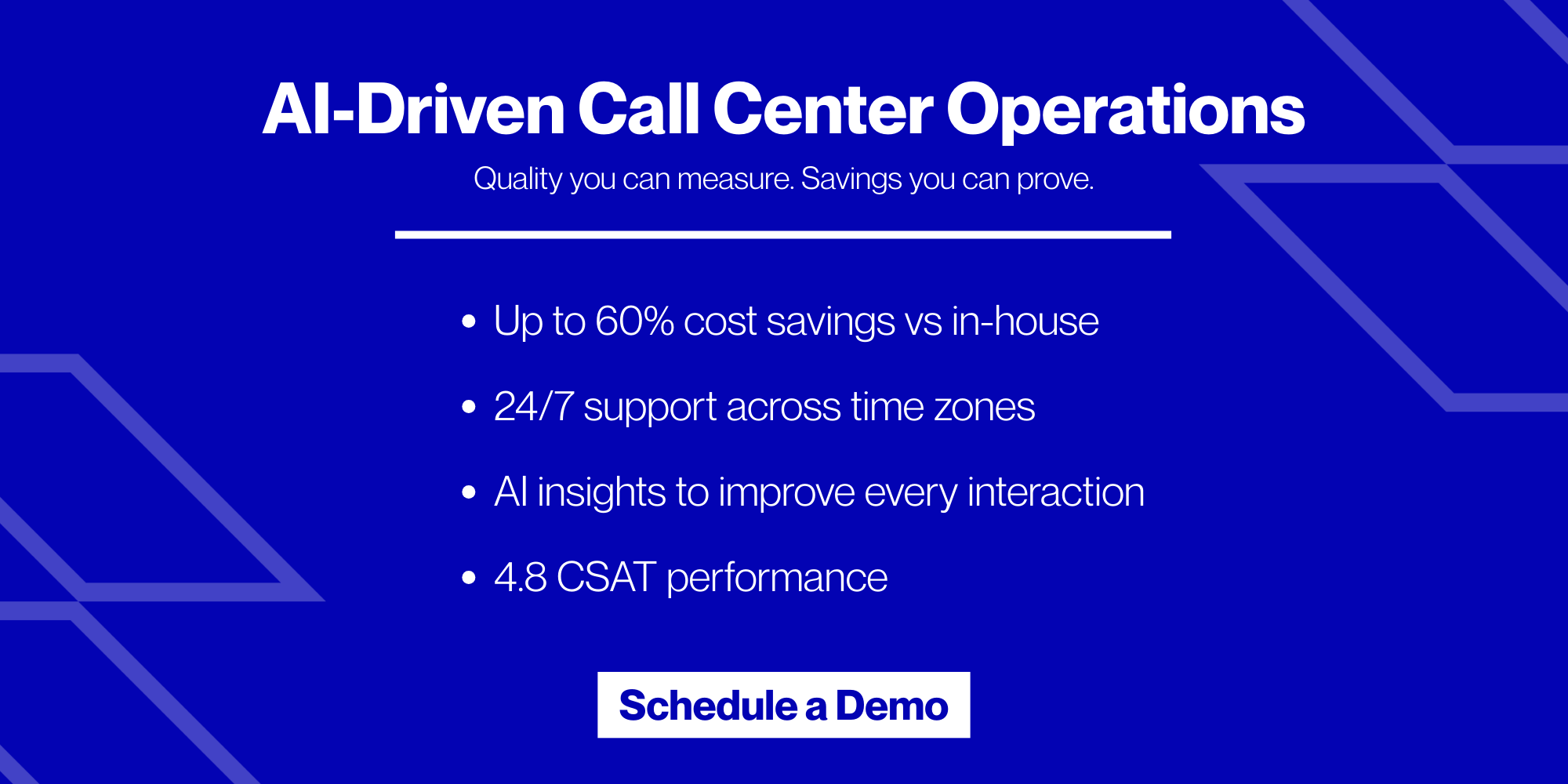Adopting a proven operational strategy for startups is the best way to build a future-proof business that is ready for scaling up when the time is deemed fit. Businesses often make it a point to collaborate with outsourcing agencies that can optimally automate their non-core functions so that they can have more control over how their workflow functions. During the course of this process, businesses are also able to reduce the cost of operations significantly, which goes a long way towards restructuring their financial investments.
Operational strategy is not just a fancy word for day-to-day planning of what happens at the office. Not convinced? Here are some stats spanning across different outsourced functionalities that might prove a point or two:
- The outsourcing market for the finance sector is set to grow at a CAGR of 9.4% till 2031, according to available data
- 70% of companies comment that the principal reason for them to outsource their CX services is to cut costs
- Globally, 80% of businesses outsource their IT services to streamline their business operations
Therefore, whether for cost-cutting or designing a better workflow, outsourcing remains a constant for businesses in 2025. Inevitably, when companies align with such strategies, they are systematically preparing for a potential upscaling of their business.
In this article, let us see what operational strategies are and how they can work as the secret weapon for businesses to scale up according to plan.
What are Operational Strategies?

Defining operational strategy is important so that startup operations optimization can be achieved, as strategies would be unique for different businesses. Devising a good operational strategy is the key to building the perfect workflow that allows for business efficiency, ultimately leading to optimum production. Thus, as you can understand, these crucial processes are interconnected, and businesses must regulate them at vital checkpoints for the best results.
Let us now take a look at the various aspects of operational strategy that businesses take care of.
- Calculated Resource Allocation: The pattern of resource allocation that a business follows is a reflection of its understanding level concerning daily operations. For instance, a business might invest more than it currently does in its inventory stocking, thus creating an artificial cash crunch. Outsourcing agencies make use of advanced AI technologies to understand resource allocation and audit it to perfection so that businesses have an idea of where they need to invest.
- Process Optimization: Data reveals that businesses have a 60% capping for changes that they can accommodate in their work processes. These changes are informed by AI-led research that finds the snags which, if fixed, can yield significantly better results. Outsourcing agencies do this work for businesses so that the latter can deliberate on and implement changes in the best possible way.
- Supply Chain Management: Supply chain management refers to the key links between processes that begin with ideating a product and end with after-sales services. In each of these processes, there might be a snag that is holding back growth for your business. If you are a startup, there’s more responsibility coming your way that, if handled carefully, can propel you into becoming a respectable brand.
- Alignment of Goals: One of the most pertinent operational strategies for startups, goal alignment is the key to achieving long-term success of a business. It is important for companies to make sure that their short-term goals are not adversarial with their long-term goals. This strategy is something that holds for all key functions. For instance, in social media management, you need to make key decisions on the sort of impact businesses want to have on their audience. This decision is again tied to the vectors of growth and scaling up that businesses have in mind.
Thus, in 2025, you stand the chance to stay one step ahead of competitors if you outsource to the right agency for optimizing these crucial work processes.
Why Could Operational Strategy be a Secret, Fast-Scaling Weapon for Startups?

Operational strategies, if perfected according to market conditions, could yield rapid results. Thus, for ambitious businesses looking for fast yet sustainable growth, several factors need to be taken care of. The operational strategy for startups could work like a charm if the following headers could be addressed.
Customer Experience
CX is one of the most important aspects that comprise operational strategy, expressly because many components of upscaling ambitions depend on it. Customer experience is no longer just a great tool that achieves customer satisfaction and increases revenue by leaps and bounds. Rather, it can create an absolutely new customer base by combining with social media marketing teams.
Brands that connect to their audience, which is spending an increasingly longer time on social media, are bound to grow faster than others. In fact, research suggests that customers are ready to pay 13-18% more for products if the CX is impressive. What constitutes ‘impressive’ might be subjective, but with the advent of conversational AI and chatbots, one can hardly guess incorrectly. Therefore, if a service upgrades the value of a product, it can potentially tap into a market that is governed by the way a brand interacts in 2025.
Cost Efficiency
Contrary to popular belief, brands do not cut costs when they are incurring losses and are being thrifty about resources. Brands do it when they have already faltered in their ambitions and have not deployed the correct operational strategy for startups. When an outsourcing agency tells a business that it needs to cut down on certain costs, it means that the agency has already found glitches in the allocation of resources. Therefore, being efficient with financial decisions while being productive with work processes is the culture that promotes fast scaling.
Operational Flexibility
A brand, especially a startup, must be flexible with its business operations so that they align with market dynamics, without, of course, compromising its fundamental ideals. Outsourcing key functionalities that can make a difference in the market could be the strategy that a startup needs to achieve its desired growth. To stress it again, flexibility is not doubting the status quo, but a decisive step towards sustaining and growing. Nevertheless, the outsourced functions must be closely monitored to attain optimal levels of efficiency. A staggering 83% of IT leaders intend to reassess outsourcing options so that they can cope better with ever-changing market principles.
AI and Automation
AI-led automation of key but repetitive processes could be the most effective operational strategy for startups. Several everyday functions could be automated so that the employees, who already have too much on their plates, could be more productive. These are some such functions:
- Data entry
- Administrative functions
- Generating timely and accurate reports
- Processing invoices without introducing errors
Freeing up employees from such time-consuming work could help them become more efficient and take up higher-value tasks. Being consistent with such high levels of competence could help the start-up gear up for upscaling, rather than get worked up about handling daily work processes.
Sustained Growth
While fast scaling is something that any business would aspire for, the prerogative should also be on how to sustain that growth. Sustained growth can only be achieved when the business ensures
- Perfect coordination between the teams, facilitating smooth working processes
- Alignment of goals and expectations, both in-house and outsourced
- Structural organization that accommodates realistic rates of growth
If a startup does not take steps to ensure these pointers, the company might see a growth that it cannot handle. Such a situation could mean that the business loses much of the reputation that it had so painstakingly built. Data reveals that 10% of startups fail within the first year, which further highlights the need to optimize operational strategies.
Scaling Up Becoming Too Much of a Task? Outsource Your Business Operations to Atidiv Today!
In case you are wondering how you should go about outsourcing your non-core business processes without having to worry about how they would be handled? You could trust Atidiv in that case with the following services:
- Customer Experience
- Finance and Accounting
- Media and Operations
- Data Engineering
- Design and Development
- Content Moderation and Safety
Atidiv has so far saved more than 50 million USD for its clients with the help of 700+ dedicated employees who are committed to the company’s vision. Contact us today for superior inbound and outbound call center services, omnichannel messaging solutions, voice support services, and more!
FAQs
1. How can my startup scale faster with a good CX service in 2025?
Startups need to provide good CX services more than businesses that have been in the market for quite some years. With CX services integrated to social media support, startups can connect with their customer base better, propagate brand ideology, and rope in more customers by enhancing engagement. Timely responses to customer queries go a long way towards customer retention, which startups can easily achieve by collaborating with outsourcing brands like Atidiv.
2. How do businesses account for process optimization in their daily operations?
Process optimization is something that businesses ensure by outsourcing non-core business functions to specialized outsourcing entities. By doing so, they gain more control over performance metrics and can improve the work allocation process significantly. Thus, businesses maintain consistency every time they complete a project and earn the trust of clients.
3. What is the role of supply chain management in upscaling?
Supply chain management refers to the use of checks and balances in every step of crucial work processes to optimize workflow. Furthermore, it is a great strategy to identify bottlenecks and work towards resolving them so that greater value can be derived from every business hour.

